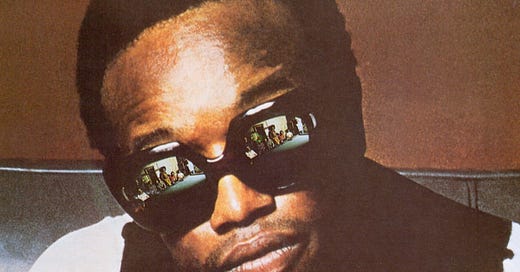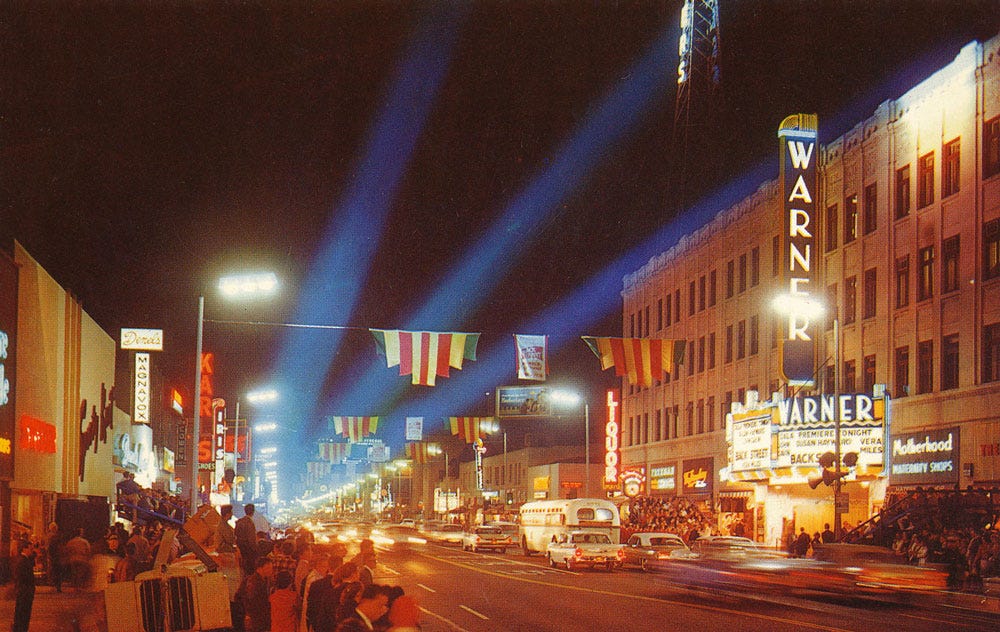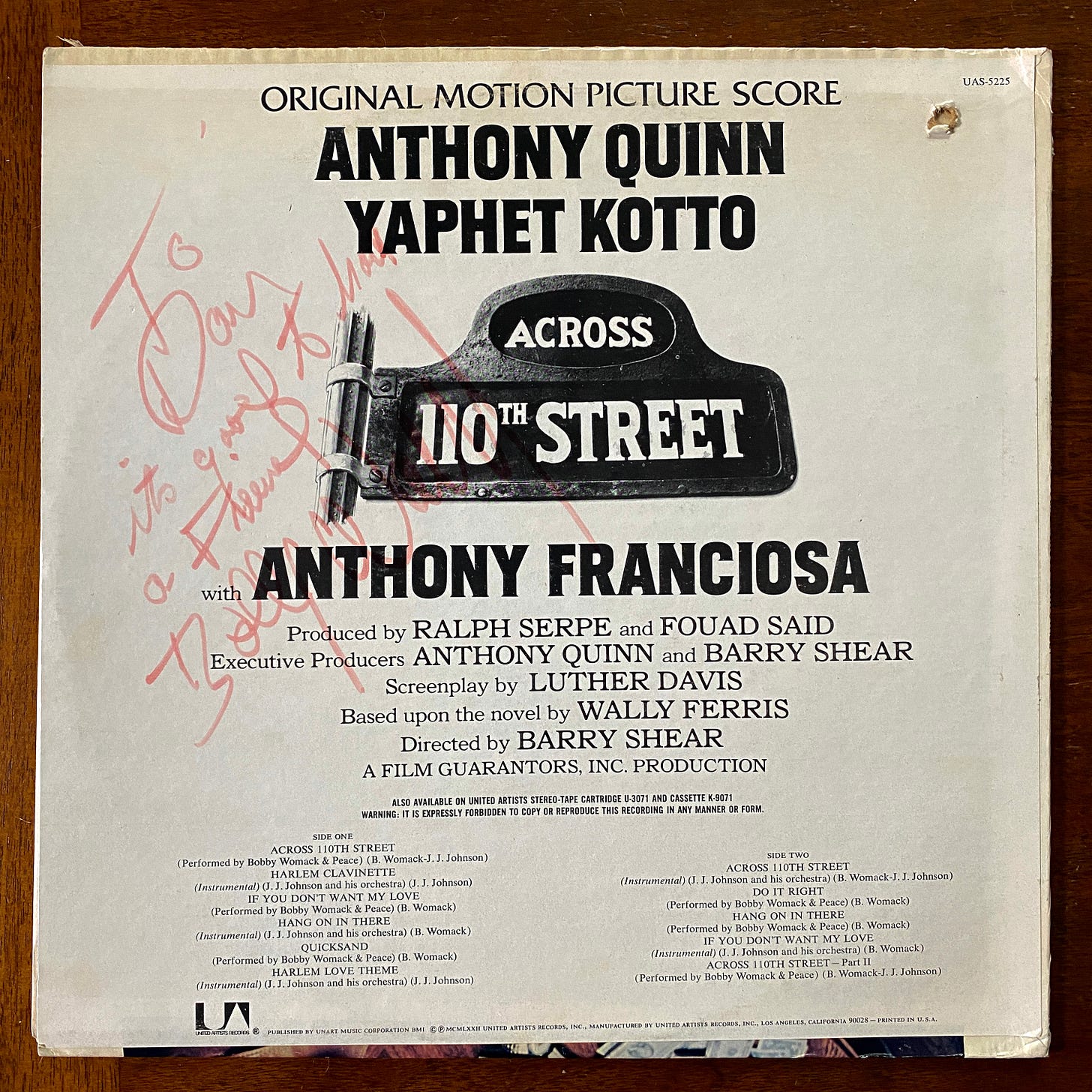[This one’s a special treat for my paid subscribers. But just let me warn you — it’s probably best not to read it while eating!]
They say you should never meet your heroes, and I’ve definitely had a few encounters over the years with famous musicians that proved that adage. But Bobby Womack was one hero that I’m forever grateful to have met.
From the very first time I heard his voice, I thought of Bobby Womack as a friend. Sure, I was in awe of his soulful pipes, his deft way with a melody, his ability to pen lyrics that said a whole lot with just a little, and his righteously funky guitar playing. But I also picked up on something really welcoming in both his singing and the advice-laden spoken intros that he hung on many of his songs, a sense of “Yeah, man, I’m cool… but not too cool to sit down with you and have a genuine heart-to-heart.”
My small handful of encounters with Bobby proved that impression absolutely correct. The first time I went to interview him, in 1994 at his bachelor pad in Sherman Oaks, CA, I expected to be greeted by some assistant or officious hanger-on who would then escort me into the soul legend’s lair. Instead, the door was answered by Bobby himself, who was clad only in boxer shorts, a sleeveless white undershirt, a couple of gold chains and those enormous glasses of his. “Hi!” he barked, grinning widely and extending a gigantic hand. “I’m Bobby — come on in!”
It took me only about 15 minutes to realize that I’d drastically over-prepared for the interview. I’d shown up with a legal pad full of questions, but Bobby wasn’t a man who needed much (or any) prompting to tell you what was on his mind. I also realized that I’d seriously goofed by only bringing a single 90-minute cassette tape with me; I figured I might get an hour of his time at most, but an hour and a half after the tape ran out he was still talking about everything from his 1976 country album BW Goes C&W (“I wanted to call it Step Aside, Charlie Pride, Give Another Nigga a Try,” he told me, “but the record company didn’t like that idea”) to freebasing cocaine with Ronnie Wood, as I frantically scrambled to take notes on my legal pad. “Just a little communication/Can help the situation,” he once sang, and Bobby clearly enjoyed communicating about anything and everything.
When his assistant showed up and beckoned Bobby into the kitchen, I figured it was a subtle signal that my time with the great man was over. But just as I was packing up my things and preparing to make my exit, Bobby stuck his head out of the kitchen and called to me. “Hey, Man,” he growled. “You want some barbecue?”
You bet I did, and so we spent another 30 minutes or so eating ribs and shooting the breeze like old pals. I still don’t remember making the drive home that evening, but there’s a pretty good chance that I actually glided blissfully over the Hollywood Hills…
There was no barbecue on offer in 1999, when I returned to Bobby’s apartment to interview him about his latest album, Back to My Roots; but otherwise he was just as welcoming and friendly as the last time I’d seen him. He was also just as garrulous, as I detailed in my subsequent feature for the LA Weekly:
Getting him to stick to a specific subject for more than a few minutes proves almost impossible. Over the course of three hours, I'm treated to several surreal dissertations on everything from his forthcoming blues and Christmas records to what's wrong with American radio, what's right with rap music, the merits of sobriety, and the respective marital woes of Rod Stewart and Mick Jagger. In conversation, as in his music, Bobby Womack is a tough man to pin down.
“I like all kinds of music,” he says. “I can't just hear one thing all the time, you know? I never understand it when a guy from the record company says, 'Give me another one like the last one.' They're like, 'You don't understand, Bobby, you've gotta stay commercial.' I say, 'Nah — I gotta stay REAL.'”
Bobby was definitely keepin’ it real that day. Not only did he offer some comforting advice about the relationship troubles I was having at the time — I wasn’t intending to bring them up, but he coaxed them out of me — but he also told me the wild and raunchy tale of his arrival in Hollywood back in the early 1960s. It’s a story that I’ve never fully shared in print before, as some of it was way too “blue” for the editors I pitched it to in the past. But since you, dear paid subscriber, have been generous enough to financially support Jagged Time Lapse, I figure you deserve the chance to read it for yourselves…
Unlike most of Bobby’s tangents that day, this one didn’t come out of left field. Back To My Roots was a gospel album, a fulfillment of a long-standing promise to his mother and father, both of whom had disapproved mightily of Bobby and his brothers’ decision to abandon gospel music for a shot at the pop charts. More from my LA Weekly piece:
Born into a religious family in Cleveland, Ohio, young Bobby honed his chops as a member of a popular gospel quintet that included his brothers Cecil, Curtis, Harris and Friendly Jr. Opening local shows for the biggest gospel acts of the day, the Womack Brothers quickly made some very influential friends, including the Soul Stirrers and the Five Blind Boys of Alabama. When Sam Cooke, the youngest Soul Stirrer, decided to leave the group to “go pop,” the gospel community was outraged.
“Sam was scared,” Bobby remembers. “At gospel shows, the audience would pass around a frying pan, and they didn't drop no 'quiet money' in there.” He laughs. “It was always change. How could you buy your mom a house when you was worried about how you gonna get to the next city? But if he put out a pop record and it didn't hit, he couldn't come back over to the gospel side. Of course, he put out 'You Send Me,' and the motherfuckin' record took off. But everybody in church was sayin', 'Watch and see what happens. Somethin' bad is gonna happen to him, because now he's serving the devil.'”
It was a dilemma that the Womack Brothers would soon experience for themselves. When Cooke asked them to make pop records for his SAR label, Bobby explained that their father wouldn't allow it.
“So he said, 'All right, I'll cut y'all a gospel. If it don't sell, you've gotta do a pop.' Now, he knew it wouldn't sell, but we didn't know that, of course. We was just glad to be makin' a record!”
Less pleased was Friendly Womack Sr., who kicked his sons out of the house upon learning of their intentions. “That was the first time I ever saw my daddy cry,” Bobby says now, with audible sadness. Apprised of the situation, Cooke wired the boys money to come to Los Angeles.
“He said, 'Get on Route 66 and stay on it all the way.' I talked my oldest brother into buying a Cadillac, because that's what I saw all the pimps in the neighborhood driving. Of course, we get on the freeway and it starts to rain, the windshield wipers won't turn on, and the car's running out of gas every 15 seconds because the tank's got a hole in it . . . We wound up in the hospital for a week, because we were overcome by gas fumes. And then the headlights came off!
“Two weeks later, we show up in L.A., pushin' the car down Hollywood Boulevard, all of us with our doo-rags on. We called Sam, and he said, 'Man, where the hell are y'all?'
“'We on Sunset. The car ain't got no more gas.'”
And this is where the story gets really juicy…
SAR Records’ tiny Hollywood office was located at 6425 Hollywood Boulevard, in the same four-story 1920s building as the ornate Warner Cinerama Theatre, which would later change its name to the Hollywood Pacific Theatre. Seeing as his young proteges were now without working wheels, Cooke put them all up in a cheap hotel within walking distance of the office. Though it wasn’t yet as gritty as it would become over the next few decades, that stretch of Hollywood Boulevard was still pretty sleazy after dark, and the unsophisticated young Midwesterners wasted no time getting into trouble.
Shortly after their less-than-auspicious arrival in Hollywood, the Womacks met an attractive woman on the Boulevard, who offered to have sex with all five of them in exchange for cash. Repairing accordingly to their hotel room, Bobby and three of his brothers took turns in bed with her, though Cecil — still in his mid-teens at the time — held back. (“She just used her hand on him,” Bobby told me.)
Once she was finished getting Womacked, the (probably exhausted) sex worker got her money and went on her way, and that was that — at least until about a week later, when Bobby suddenly found it agonizingly painful to urinate. When Bobby stopped into the SAR office for a visit, Cooke and his grey-haired business partner J.W. Alexander noticed him shifting uncomfortably and asked him if he was okay.
“I told ‘em, ‘Man, it hurts bad whenever I try to pee,’” Bobby recalled. “They asked me if I’d been with a girl, and I told ‘em yeah. And Sam says, ‘Bobby, sounds to me like you’ve got The Gonga-Rea!’”
(I swear upon my signed copy of Across 110th Street that Bobby pronounced “gonorrhea” like it was a creature out of a Japanese monster movie. I’m sticking with the phonetic spelling here, both in the interest of presenting Bobby as he was, and because it’s really fucking hilarious.)
Unsure of what to do about his first brush with venereal disease, Bobby asked the older men for advice. “Well, you’ve got to go see the doctor,” Cooke told him, as Alexander nodded silently in agreement. “What they do is, they make you take your Johnson out and put it on the table. And then they take a big hammer and hit your Johnson with it over and over again, until all the Gonga-Rea squirts out!”
Bobby didn’t realize Sam was joking — and since he didn’t much like the sound of the procedure, he held off on seeking treatment until the pain simply became too much to bear. (I should note here that it was unclear whether or not any of his brothers had also gotten “The Gonga-Rea,” and if Sam had fed them a similar line of bullshit about it.) Finally, a shamed-faced Bobby made his way to the local clinic.
“I told ‘em I got The Gonga-Rea,” he recalled, “And they sent me back to the examination room. I was so scared about what was gonna happen next; when the nurse came in, she saw me looking around the room, all nervous. She asked me, ‘What are you looking for?’ and I said, ‘Where’s the hammer at?’” He laughed uproariously at the memory. “Man, she looked at me like I was all kinds of crazy!”
The last time I saw Bobby was a few months later in the summer of ‘99. I was enjoying cocktails with some friends in the front window of Yamashiro, the legendary Japanese restaurant in the Hollywood Hills, when we saw Bobby get out of a car and enter the restaurant with an attractive young woman on his arm. The staff seated them a few tables behind us; I wanted to say hello, but I didn’t want to harsh his vibe. My girlfriend came up with the brilliant idea of sending him a drink — it wouldn’t be intrusive, and Bobby would probably appreciate being shown a little respect and recognition in front of his date. I called our server over and told her to ask the gentleman in the glasses what he wanted to drink, and to put it on our tab.
My back was to Bobby’s table, so I couldn’t see the interaction between him and our server. “Dan! Dan!” my friends started buzzing excitedly. “Turn around!” I did so and was greeted with the joyful vision of Bobby waving enthusiastically at me. “Hey, Man!” he shouted across the room. “Good to see ya! Come on over here!”
After introducing me to his date, Bobby proceeded to talk my ear off for about 15 minutes before I made my excuses and went back to our table. I have no memory of what drink he ordered, or most of what we talked about — though I’m quite sure “The Gonga-Rea” did not come up — other than that he was going into a local recording studio with Eric Clapton the following week. “You should come down!” he insisted, and I’d have taken him up on it if I didn’t already have plans to be out of town. Clapton’s never been a favorite of mine, but it would have been really interesting to watch the two of them recording together…
Ultimately, the thing I remember most from that Yamashiro encounter was how genuinely delighted he seemed to see me, and how sending him a drink seemed to really make his night — which, given how much pleasure his music has brought me over the decades, was really the least I could have done for him…
Back in 1994, I’d brought my copy of Bobby’s incredible Across 110th Street soundtrack to our first interview, hoping I could get him to sign it. “To Dan — it’s good to have a friend,” he wrote on the back of the album, in between taking bites from his slab of ribs. And while I can’t say I knew Bobby Womack well, for the six or seven total hours we spent together, he truly made me feel like his friend. And that’s something I’ll never, ever forget.







Brilliant, and I feel now like I knew him - what a wonderful gift you had with his company!
Beautiful!